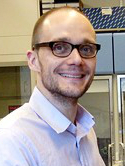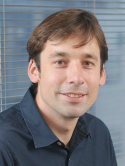Origin plasticity during budding yeast DNA replication in vitro Journal Article
| Authors: | Gros, J.; Devbhandari, S.; Remus, D. |
| Article Title: | Origin plasticity during budding yeast DNA replication in vitro |
| Abstract: | The separation of DNA replication origin licensing and activation in the cell cycle is essential for genome stability across generations in eukaryotic cells. Pre-replicative complexes (pre-RCs) license origins by loading Mcm2-7 complexes in inactive form around DNA. During origin firing in S phase, replisomes assemble around the activated Mcm2-7 DNA helicase. Budding yeast pre-RCs have previously been reconstituted in vitro with purified proteins. Here, we show that reconstituted pre-RCs support replication of plasmid DNA in yeast cell extracts in a reaction that exhibits hallmarks of cellular replication initiation. Plasmid replication in vitro results in the generation of covalently closed circular daughter molecules, indicating that the system recapitulates the initiation, elongation, and termination stages of DNA replication. Unexpectedly, yeast origin DNA is not strictly required for DNA replication in vitro, as heterologous DNA sequences could support replication of plasmid molecules. Our findings support the notion that epigenetic mechanisms are important for determining replication origin sites in budding yeast, highlighting mechanistic principles of replication origin specification that are common among eukaryotes. Synopsis Cell-free budding yeast DNA replication has been achieved with reconstituted pre-replication complexes, allowing for detailed biochemical characterizations and revealing a surprising lack of strict DNA initiation sequence requirement, reminiscent of the mainly epigenetic replication origin specification observed in other eukaryotes. Pre-RCs reconstituted with purified budding yeast proteins support DNA replication in vitro. DNA molecules licensed with reconstituted pre-RCs undergo one round of complete replication. Budding yeast DNA replication in vitro is not strictly dependent on origin DNA sequences. Pre-RC assembly site selection is flexible in vitro. Mcm2-7 loading onto DNA is essential, but not sufficient to license DNA for replication. Reconstituted pre-replication complexes support cell-free replication with no strict initiation sequence requirement, hinting to an epigenetic component in replication origin specification even in budding yeast. © 2014 The Authors. |
| Keywords: | dna replication; cell cycle; budding yeast; origin; pre-rc |
| Journal Title: | EMBO Journal |
| Volume: | 33 |
| Issue: | 6 |
| ISSN: | 0261-4189 |
| Publisher: | Wiley Blackwell |
| Date Published: | 2014-03-18 |
| Start Page: | 621 |
| End Page: | 636 |
| Language: | English |
| DOI: | 10.1002/embj.201387278 |
| PROVIDER: | scopus |
| PUBMED: | 24566988 |
| PMCID: | PMC3989655 |
| DOI/URL: | |
| Notes: | Export Date: 1 May 2014 -- CODEN: EMJOD -- Source: Scopus |
Altmetric
Citation Impact
BMJ Impact Analytics
MSK Authors
Related MSK Work






